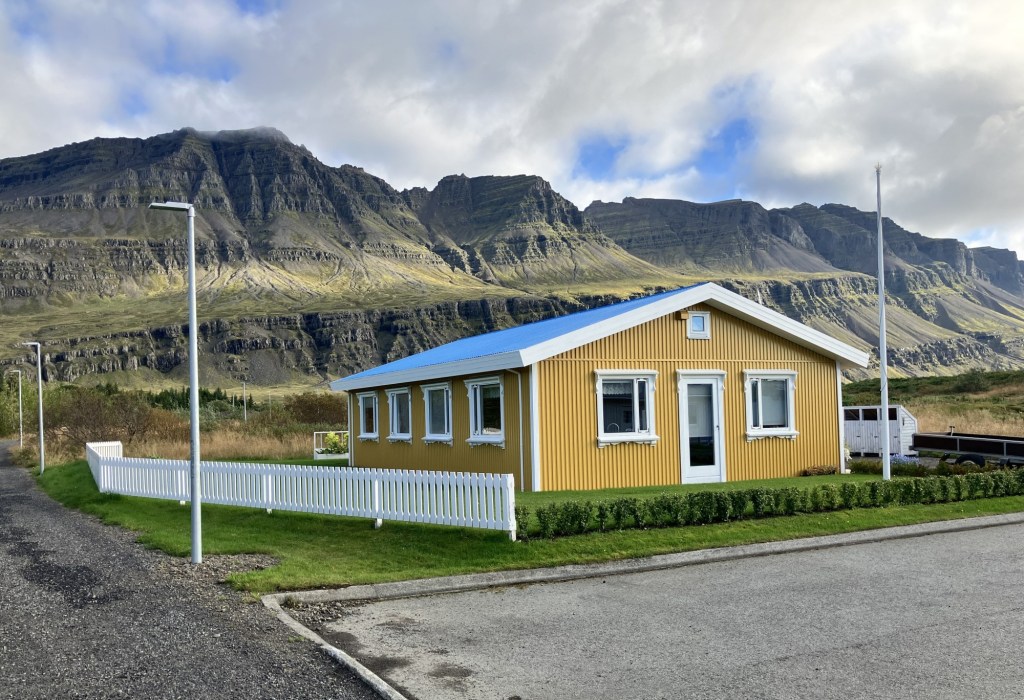The Wife and I just got back from stimulating the economy of Europe: a week in Iceland, then Belgium, Luxembourg, Germany, and Holland. Our VISA bill will arrive by postal forklift. Still, it was good to get away, especially when the headlines at home were dominated by the president telling the UN their countries are “going to hell,” the brutal murder of Charlie Kirk, and the firestorm over Jimmy Kimmel’s suspension from ABC. 5,796 miles of separation were not enough to inoculate us from the relentless churn of outrages and awfulness that dominates contemporary American life.
It’s always risky to draw conclusions about life in other countries while on a leisure trip, but it’s fair to say I saw no sign of anyone “going to hell.” Just the opposite. We drove the entire perimeter of Iceland and the width of Belgium from Brugge into Luxembourg City, Luxembourg. We traveled on highways and country roads to Bastogne, St. Vith, Elsenborn, on the city streets of Aachen, Germany, and Maastricht, Holland, and into the crowded urban sprawl of Brussels. We traveled on pristine ribbons of asphalt, free from cracks, potholes, and slurry-seal repairs—roads we can only dream of in Los Angeles.
Litter? None. Anywhere.
Without exaggeration, we saw a single car with a dented fender parked on a street in Brussels. One. How is that possible? We passed thousands of cars in five countries, and every car was brand new or newish with no dents or scratches. How do they do it?
Also, zero bumper stickers. No pickup trucks with flags, no “Save [fill-in-the-blank]” messages. Belgians don’t use their cars to proselytize.
Homelessness? We spotted a few panhandlers in Brussels and Luxembourg City, but very few. I see more homeless in Woodland Hills than in Brussels, a city of more than two million.
Life is not perfect in these countries. Belgium has deep divisions over language, and Brussels has a drug and gang problem. But after roaming for 16 days in big cities and backwaters, it was impossible not to wonder how they pay for all this.
Taxes.
Belgium has a progressive tax code that tops out at 50 percent for those earning $56,621 or more. Additionally, they pay a VAT tax of 21 percent on everything they purchase. Nobody is happy about it. Still, they’re getting value for their euros. The physical condition of Iceland, Belgium, Luxembourg, Germany, and the Netherlands was glaringly better than our neglected and crumbling roads and civic infrastructure.
With taxes that high, there can’t be much left for anything other than food and rent, right? Yet, I saw no signs of deprivation anywhere. Driving past sheep ranches in northern Iceland and the dairy region of eastern Belgium, homes and outbuildings were universally in excellent condition, freshly painted with new windows and doors. We saw no shacks, no collapsing barns, no cars up on blocks, or sofas left on street corners. In a tiny Icelandic fishing village I can’t pronounce, population 139, the locals live in brightly colored homes with manicured landscaping despite some of the toughest weather on the planet. How come our roads and neighborhoods don’t look like this?
We pay taxes, too.
The Feds are first in line, but then there are state taxes, city taxes, county taxes, school taxes, Benefit Assessment District (BAD) taxes, and sales taxes on almost everything we buy. We also pay “fees” for car registrations and a host of other services. Are we getting our money’s worth?
This isn’t an anti-tax screed. But my recent look at how the other half lives opened my eyes to the mediocre, wasteful way our tax dollars are spent. The Wife and I took a stroll through Kinnekswiss Park in Luxembourg City, a massive elysian of rolling lawns and shade trees, public art, gardens, and the best children’s playground we’ve ever seen. Spend a day in an L.A. public park and then tell me which country is “going to hell.”
This is not a Left/Right issue. It’s about competence. And it’s about culture. It doesn’t cost a penny to throw trash in a can rather than out the car window. The people in Iceland, Belgium, Luxembourg, Germany, and Holland demand clean streets and neighborhoods. They live it at the personal level. Why don’t we have the same pride in place?
There are many things America does well—some things brilliantly. But our history of forward progress, both material and social—even if it’s been two steps forward, one step back at times—seems like three steps back today.
Our European allies are baffled by today’s America. Our president called green energy a “scam” at the United Nations. He claims windmills cause cancer. Belgium is dotted with windmills, and they don’t seem to be any more cancer-stricken than we are, and their air is healthier for their children to breathe. Our European friends cannot fathom why we tolerate gun violence, as if school shootings are a natural condition of childhood. History has taught them a painful lesson.
During our brief travels we visited or passed by the scenes of horrific bloodshed: Flanders, Waterloo, Bastogne, St. Vith, Malmedy, Elsenborn Ridge, etc. Belgium is known as the “Battlefield of Europe,” with everyone from Charlemagne to Napoleon, the Kaiser, and Hitler rolling through and leaving death and destruction in their wake. Today, they live again with war clouds on the horizon as Putin tests NATO and American resolve.
Upon returning home, we were greeted by the president encouraging our top generals to use American cities and citizens—“the enemy within”—for training. That chilling and un-American notion was then followed by a government shutdown.
Whose country is “going to hell?”
Doug McIntyre’s column appears Sundays. Doug@DougMcIntyre.com
